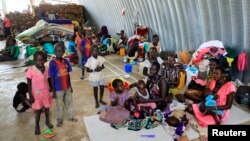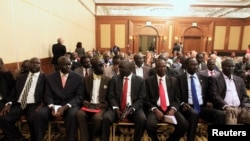WASHINGTON —
The United States says a political solution may be in the works to end the deadly fighting in South Sudan. But that is not stopping U.S. defense officials from repositioning troops just in case the crisis gets worse.
As thousands of South Sudanese gathered at a United Nations camp in Juba seeking safety, the U.S. special envoy to Sudan and South Sudan also was in the capital, meeting with President Salva Kiir.
Ambassador Donald Booth, speaking by phone to reporters in Washington, said Monday the two had a "frank and open discussion," and that Kiir is ready to begin talks with former vice president Riek Machar to end the violence.
Booth also visited with 11 senior officials allied with Machar, who are being held in Juba. He said they are in good health, and he expressed a willingness to end the crisis peacefully.
All eyes on young nation
Earlier, though, Machar told Reuters there can be no talks until they are released.
"These are the people who will engage in the dialogue. We want a peaceful settlement of this conflict. We do not want our people to be subjected to a lot of suffering. They have already suffered enough. We want peace,'' he said.
At the United Nations, Secretary-General Ban Ki-moon warned both sides the world is watching. "Attacks on civilians and the U.N. peacekeepers deployed to protect them must cease immediately. The United Nations will investigate reports of grave human rights violations and crimes against humanity. Those responsible at the senior level will be held personally accountable and face the consequences - even if they claim they had no knowledge of the attacks.''
There are about 7,000 U.N. peacekeepers in South Sudan, and the secretary-general is asking for more to be sent.
Ban Ki-moon has asked the Security Council to send 5,500 more peacekeepers to South Sudan as soon as possible, to protect civilians from worsening violence.
The Security Council is due to vote Tuesday afternoon on a resolution to transfer troops from other U.N. missions in Africa.
The United States Africa Command also is taking precautions, said U.S. Army Colonel Steve Warren. "The combatant commander is repositioning his forces in the region to ensure that we've got capabilities necessary to respond to any request from the State Department."
U.S. officials already have evacuated about 380 Americans from South Sudan and say more American civilians may still be in the country. As of yet, they say there has been no request to use those troops in what a senior administration official describes as a very fluid situation.
Bloody ethnic clashes
Journalist Hannah McNeish, who is in the capital, Juba, said the fighting has a clear ethnic element, with members of the Nuer and Dinka ethnic groups targeting each other.
"There are people going house to house, tracking people down in term of ethnicity. They are taking them out of their houses, they are binding their hands, and executing them if they are not the right ethnicity. This is completely out of control," said McNeish.
Soldiers believed to be allied with Machar have taken over the capitals of South Sudan's Unity and Jonglei states.
South Sudan army spokesman Phili Aguer said troops will retake those towns. “Definitely the army will recontrol these areas. It's a matter of days and the army will control Jonglei state, and we will work for the re-establishment of the full control of the national army over South Sudan."
Intense U.S. focus
The spokesman also accused fighters backing Machar of shooting at a U.S. aircraft that was evacuating citizens from Bor on Saturday. The U.S. military did not identify the shooters, but said four of its personnel were injured.
U.S. President Barack Obama said Sunday he "may take further action" to protect Americans in South Sudan.
Obama is on vacation in the Pacific state of Hawaii, but he said in a letter to congressional leaders that about 46 U.S. troops were deployed Saturday to help with the evacuation. That is in addition to 45 troops deployed to reinforce the U.S. embassy in Juba.
The U.N. secretary-general called on South Sudan leaders to find a "political means" to address the conflict, saying the continued violence poses a "dangerous threat" to the future of the young country.
As thousands of South Sudanese gathered at a United Nations camp in Juba seeking safety, the U.S. special envoy to Sudan and South Sudan also was in the capital, meeting with President Salva Kiir.
Ambassador Donald Booth, speaking by phone to reporters in Washington, said Monday the two had a "frank and open discussion," and that Kiir is ready to begin talks with former vice president Riek Machar to end the violence.
Booth also visited with 11 senior officials allied with Machar, who are being held in Juba. He said they are in good health, and he expressed a willingness to end the crisis peacefully.
All eyes on young nation
Earlier, though, Machar told Reuters there can be no talks until they are released.
"These are the people who will engage in the dialogue. We want a peaceful settlement of this conflict. We do not want our people to be subjected to a lot of suffering. They have already suffered enough. We want peace,'' he said.
At the United Nations, Secretary-General Ban Ki-moon warned both sides the world is watching. "Attacks on civilians and the U.N. peacekeepers deployed to protect them must cease immediately. The United Nations will investigate reports of grave human rights violations and crimes against humanity. Those responsible at the senior level will be held personally accountable and face the consequences - even if they claim they had no knowledge of the attacks.''
There are about 7,000 U.N. peacekeepers in South Sudan, and the secretary-general is asking for more to be sent.
Ban Ki-moon has asked the Security Council to send 5,500 more peacekeepers to South Sudan as soon as possible, to protect civilians from worsening violence.
The Security Council is due to vote Tuesday afternoon on a resolution to transfer troops from other U.N. missions in Africa.
The United States Africa Command also is taking precautions, said U.S. Army Colonel Steve Warren. "The combatant commander is repositioning his forces in the region to ensure that we've got capabilities necessary to respond to any request from the State Department."
U.S. officials already have evacuated about 380 Americans from South Sudan and say more American civilians may still be in the country. As of yet, they say there has been no request to use those troops in what a senior administration official describes as a very fluid situation.
Bloody ethnic clashes
Journalist Hannah McNeish, who is in the capital, Juba, said the fighting has a clear ethnic element, with members of the Nuer and Dinka ethnic groups targeting each other.
"There are people going house to house, tracking people down in term of ethnicity. They are taking them out of their houses, they are binding their hands, and executing them if they are not the right ethnicity. This is completely out of control," said McNeish.
Soldiers believed to be allied with Machar have taken over the capitals of South Sudan's Unity and Jonglei states.
South Sudan army spokesman Phili Aguer said troops will retake those towns. “Definitely the army will recontrol these areas. It's a matter of days and the army will control Jonglei state, and we will work for the re-establishment of the full control of the national army over South Sudan."
Intense U.S. focus
The spokesman also accused fighters backing Machar of shooting at a U.S. aircraft that was evacuating citizens from Bor on Saturday. The U.S. military did not identify the shooters, but said four of its personnel were injured.
U.S. President Barack Obama said Sunday he "may take further action" to protect Americans in South Sudan.
Obama is on vacation in the Pacific state of Hawaii, but he said in a letter to congressional leaders that about 46 U.S. troops were deployed Saturday to help with the evacuation. That is in addition to 45 troops deployed to reinforce the U.S. embassy in Juba.
The U.N. secretary-general called on South Sudan leaders to find a "political means" to address the conflict, saying the continued violence poses a "dangerous threat" to the future of the young country.





